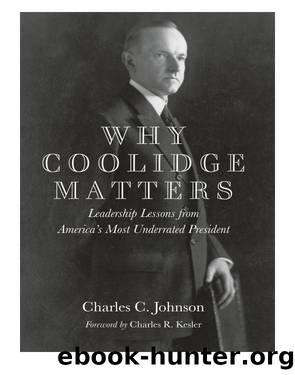Why Coolidge Matters by Charles C. Johnson

Author:Charles C. Johnson
Language: eng
Format: epub
Publisher: Encounter Books
Published: 2013-02-28T16:00:00+00:00
Governor Walsh signed the bill on May 21. Silent Cal never explained the reason he voted for it, but its effect was clear. By passing legislation to censor Birth of a Nation, Massachusetts undermined the claim of the film’s producers and promoters that prominent politicians supported the film. After the law was enacted, the film’s popularity waned.55 President Wilson was now embarrassed to have shown it at the White House.56 Coolidge had quietly gone about doing the “day’s work” and slowing the dissemination of the film that was spurring the Klan’s rapid growth.
In doing “the day’s work” against Birth of a Nation, Coolidge neatly illuminated yet another contrast between Wilson and himself on racial issues. Coolidge had come of age in a time when lynchings were rampant. As Felzenberg notes, “between 1885 and 1894 . . . an estimated 1,700 lynchings of Negroes had taken place in the United States.”57 Like the young Lincoln, Coolidge hated lynching not only because of what it did to individuals, but because of what it did to the rule of law. In contrast, A. Mitchell Palmer, Wilson’s attorney general, entrusted with defending the people’s law, had given a commencement speech at Swarthmore in which he defended the lynching of Italian Americans in New Orleans in 1891.58 Unsurprisingly, with such an attorney general, lynchings increased during Wilson’s time in office, from thirty-six nationwide in 1917, to sixty in 1918, to seventy-six in 1919.59 To be sure, in later life Wilson said he had merely been helping out his screenwriter friend, Dixon, but Coolidge had no such friends. While Coolidge called lynching a crime against civilization and wanted to curtail it, Wilson never denounced it, even though the problem was worsening during his presidency. Wilson showed The Birth of a Nation at the White House; Coolidge, as Senate president, cast the definitive vote to help censor it. Wilson promised to make the world safe for democracy; Coolidge defended American democracy against the sorts of people that had watched and loved The Birth of a Nation.
Coolidge strongly rejected racial prejudice in whatever form it reared itself. In determining a man’s worth, he argued, “we shall have to look beyond the outward manifestations of race and creed,” because God had “not bestowed upon any race a monopoly of patriotism and character.”60 To Coolidge, race had no bearing on a man’s character, and therefore racist beliefs and behavior were hostile toward the Union.
“The Nation,” he argued at Howard University in 1924, “has need of all that can be contributed to it through the best efforts of all its citizens.” It became especially clear that blacks were a part of that nation in World War I, when they had “repeatedly proved their devotion” to the “high ideals of our country.”61 The war prompted a more complete political equality, Coolidge stressed, because the “Negro did his part precisely as did the white man . . . [and] drew no color line when patriotism made its call upon him.”62 Further, “he gave
Download
This site does not store any files on its server. We only index and link to content provided by other sites. Please contact the content providers to delete copyright contents if any and email us, we'll remove relevant links or contents immediately.
| Anarchism | Communism & Socialism |
| Conservatism & Liberalism | Democracy |
| Fascism | Libertarianism |
| Nationalism | Radicalism |
| Utopian |
The Secret History by Donna Tartt(16623)
The Social Justice Warrior Handbook by Lisa De Pasquale(11489)
Thirteen Reasons Why by Jay Asher(7788)
This Is How You Lose Her by Junot Diaz(5771)
Weapons of Math Destruction by Cathy O'Neil(5036)
Zero to One by Peter Thiel(4824)
The Myth of the Strong Leader by Archie Brown(4789)
Promise Me, Dad by Joe Biden(4447)
Beartown by Fredrik Backman(4418)
Stone's Rules by Roger Stone(4415)
How Democracies Die by Steven Levitsky & Daniel Ziblatt(4398)
The Fire Next Time by James Baldwin(4342)
100 Deadly Skills by Clint Emerson(4077)
A Higher Loyalty: Truth, Lies, and Leadership by James Comey(4032)
Rise and Kill First by Ronen Bergman(4012)
The David Icke Guide to the Global Conspiracy (and how to end it) by David Icke(3881)
The Farm by Tom Rob Smith(3872)
Secrecy World by Jake Bernstein(3782)
The Doomsday Machine by Daniel Ellsberg(3731)
